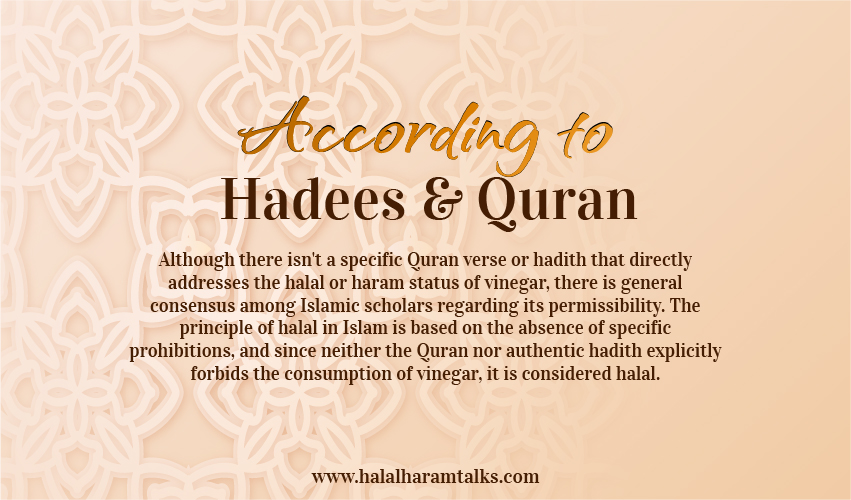It is a commonly used condiment in households and culinary settings, but when it comes to determining whether it is halal or haram (permissible or forbidden) in Islam, there may be some confusion. In order to understand the status of it within the realm of halal and haram, it is important to delve into the topic and explore various aspects associated with it.
Is Vinegar Halal or Haram
Vinegar, made through the fermentation process of various raw materials, has long been a staple in cooking and food preservation. The question arises, is it halal or haram? According to the majority of scholars and Islamic jurists, vinegar is considered halal. This ruling is based on several factors, such as the transformation of substances during fermentation and the lack of any impure or forbidden ingredients. It is worth noting that this applies to vinegar derived from permissible substances.
For more: Is Balsamic Vinegar Halal Yes/No
Ingredients Used in Vinegar
Vinegar can be made from a variety of sources, including fruits, grains, and alcohol. In terms of its ingredients, the primary components of vinegar are water and acetic acid. The source of acetic acid may vary depending on the type of vinegar being produced. Different types of vinegar, such as white wine vinegar, red wine vinegar, and balsamic vinegar, have distinct characteristics and flavors due to the different sources from which they are derived.
For more:Is Rice Wine Vinegar Halal
Quran Verse or Hadith Referring to the Halal or Haram Status of Vinegar
Although there isn’t a specific Quran verse or hadith that directly addresses the halal or haram status of vinegar, there is general consensus among Islamic scholars regarding its permissibility. The principle of halal in Islam is based on the absence of specific prohibitions, and since neither the Quran nor authentic hadith explicitly forbids the consumption of vinegar, it is considered halal.

Is White Wine Vinegar Halal?
White wine vinegar is a type of vinegar made from white wine. As wine is considered haram (forbidden) in Islam, there is a difference of opinion among scholars regarding the permissibility of white wine vinegar. Some scholars argue that the process of transforming wine into vinegar changes its nature, rendering it halal, while others maintain that it remains haram due to its origin. To err on the side of caution, it is advisable for Muslims to choose alternative types of vinegar whenever possible.
For more: Is Wine Vinegar Halal
Is Red Wine Vinegar Halal?
Similar to white wine vinegar, red wine vinegar is produced from red wine. The debate surrounding the halal status of red wine vinegar is comparable to that of white wine vinegar. Due to the uncertainty, it is recommended that Muslims to opt for alternative vinegar options to avoid any potential issues related to its haram origin.
For more: Is Parmesan Cheese Halal [With Proof]
Is Spirit Vinegar Halal?
Spirit vinegar, also known as distilled vinegar, is derived from distilled alcohol. As alcohol is explicitly prohibited in Islam, the general consensus among scholars is that spirit vinegar is not halal. Muslims should avoid consuming products containing spirit vinegar.
For more: Is Spirit Vinegar Halal
Is Balsamic Vinegar Halal?
Balsamic vinegar is a type of vinegar originating from Italy, typically made from the concentrated juice of grapes. Since it does not contain any haram substances and is not derived from alcohol. Balsamic vinegar is generally considered halal and can be consumed by Muslims.
For more: Is Bovine Gelatin Halal
Is Rice Vinegar Halal According to the Primary Schools of Thought?
According to the majority opinion of scholars from the Hanafi, Shafi’i, Maliki. And Hanbali schools of thought, rice vinegar is considered halal. Rice it is made from fermented rice, and as rice is considered a halal ingredient in Islam, the resulting it is also permissible for consumption.
The Role of Certification in Determining the Halal Status of Vinegar
Given the increasing demand for halal products worldwide, the role of certification has become vital in determining the halal status of food items, including it. Halal certification ensures that a product complies with Islamic dietary laws and is free from any Haram elements. By obtaining halal certification, manufacturers can appeal to the Muslim consumer market and instill confidence in the halal status of their products.
FAQ
A: There is a difference of opinion among scholars regarding the permissibility of vinegar derived from wine. While some consider it halal due to the transformation process, others maintain that it remains haram due to its origin. It is best for Muslims to choose alternative vinegar options to avoid any potential issues.
A: The majority of scholars agree that it made from permissible sources is halal. However, certain types of vinegar, such as spirit vinegar derived from alcohol, are considered haram. It is essential for Muslims to check the source and production process of making to ensure its halal status.
A: While the presence of halal certification adds an extra layer of assurance, not all halal products are necessarily certified. Some manufacturers may follow the necessary guidelines and processes to ensure the halal status of their products without obtaining formal certification. However, it is recommended to look for trusted halal certification logos to make more informed choices.
Conclusion
Vinegar is widely regarded as a halal condiment in Islam.As long as it is derived from permissible sources and does not contain any impure or haram ingredients. The absence of specific prohibitions in the Quran or authentic hadith regarding vinegar further supports its permissibility.
However, when it comes to vinegar made from haram substances. Like wine or alcohol, there is a difference of opinion among scholars. In such cases, it is prudent for Muslims to choose alternatives to avoid any potential concerns.
To learn more about halal and haram in Islam, visit our website for comprehensive information and resources. Understanding the principles of halal and haram allows Muslims to make conscious choices in their dietary habits. And ensures adherence to their religious beliefs.
